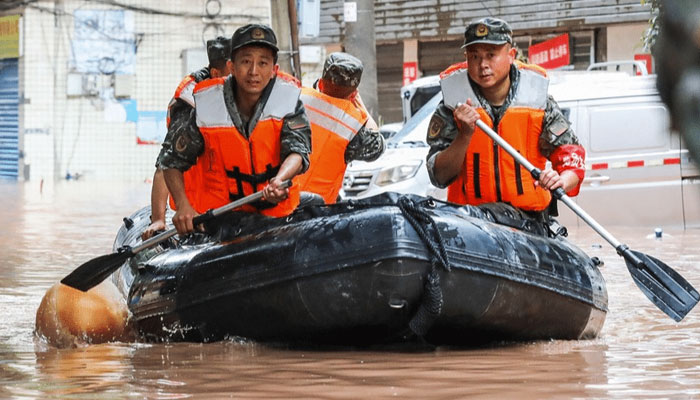Extreme monsoon rains, floods claim over 100 lives in Asia
Scientists link flash floods across Asia and rising temperatures to climate change
Over 100 people have been killed in Asia this month as mostly climate-change-driven extreme rainfall over the previous two weeks has led to unprecedented flooding and landslides in a number of Asian nations, including China, Japan, India, and Pakistan.
The result has been the evacuation of hundreds of thousands of people.
According to Pakistan's National Disaster Management Authority (NDMA), at least 86 people have passed away since June 25 as a result of the country's ongoing monsoon rains, which have resulted in a significant loss of life and property.
At least 37 of those killed were children, and 33 men and 16 women also perished in various incidents. The NDMA record states that the recent rains have resulted in at least 151 injuries, including 56 men, 43 women, and 52 children.
While a storm tore through the South Korean capital of Seoul on Friday, authorities in the Philippines issued a tropical cyclone warning.
At least eight people, including a local politician, died in record-breaking floods on the island of Kyushu earlier this week, according to reports from Japan. Others remain unaccounted for.
"It's raining like never before," a spokesman for Japan's meteorological agency said, as cities around the country logged record amounts of rain.
Scientists warn that climate change has increased the risk of floods worldwide. Many countries are struggling to mitigate the dangers of extreme weather.
According to the director of hydrology, water, and cryosphere at the World Meteorological Organisation, developed nations like Japan are "extremely alert and they are also very well prepared when it comes to flood management measures."
"But many low-income countries have no warnings in place, hardly any flood defence structures, and no integrated flood management," Stefan Uhlenbrook, Strategic Programme Director, Water, Food, and Ecosystems at IWMI, Colombo, Sri Lanka, added in his statement on Thursday.
Japanese authorities had earlier in the week evacuated more than 420,000 residents from two prefectures on Kyushu Island.
"Your life is in danger; you need to take action immediately," the orders read.
Meanwhile, in Seoul, 135 people were evacuated early Friday as torrential rain hit the South Korean capital, causing power cuts across 4,000 households, the BBC reported.
South Korean Prime Minister Han Duck-soo emphasised preventing deaths and urged public officials to remain alert until the end of the monsoon.
He warned of the possibility of North Korea releasing water from a dam near the inter-Korean border after heavy rain, which has often caused flooding and deaths in the South.
Scientists suggest that climate change, caused by global warming, has increased the likelihood of heavy rain globally due to a warmer atmosphere holding more water.
El Niño, a weather event where sea surface temperatures rise to 0.5 C above the long-term average, was declared for the first time in seven years by the World Meteorological Organisation, which set the stage for a surge in global temperatures as well as disruptive weather and climate patterns, according to the organisation.
Furthermore, heavy rain has caused severe damage in China and India, with landslides, flash floods, and property collapses causing nearly 100 deaths in northern India.
Additionally, Delhi's subway system has been shut down, putting pressure on flooded roads. Phnom Penh in Cambodia experienced flash floods, causing 14 districts to be affected.
Meanwhile, in the Philippines, heavy floods caused a 17-kilometer traffic jam on a major highway leading to Manila, with some flights cancelled. Authorities expect the heavy rains to continue as a tropical cyclone lashes regions northeast of the capital.
-
Daniel Radcliffe reveals surprising way fatherhood changed him
-
Alan Cumming shares plans with 2026 Bafta Film Awards
-
OpenClaw founder Peter Steinberger hired by OpenAI as AI agent race heats up
-
Chinese New Year explained: All you need to know about the Year of the Horse
-
Canadian passport holders can now travel to China visa-free: Here's how
-
Edmonton weather warning: Up to 30 cm of snow possible in parts of Alberta
-
ICE agents 'fake car trouble' to arrest Minnesota man, family says
-
China confirms visa-free travel for UK, Canada nationals












